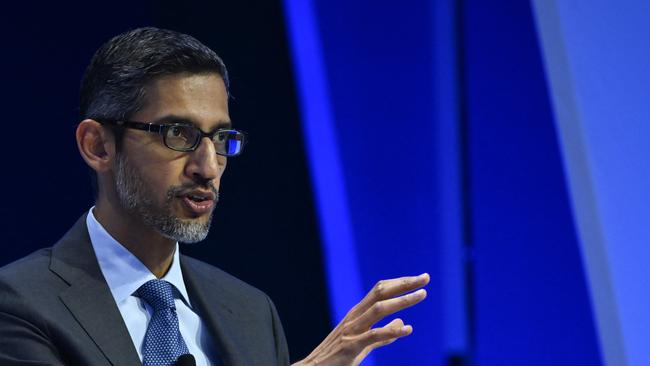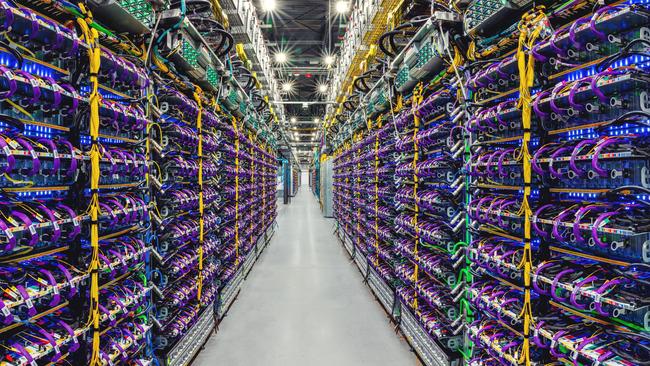‘Bigger than mobile phones and the web’: Google reveals generative AI competitor to ChatGPT
After its first effort failed to take off like ChatGPT, Google has unleashed a powerful new AI platform it says is more powerful than anything before it as the AI arms race intensifies.

Google has unleashed its competitor to ChatGPT, saying it is more powerful than any chatbot on the market as the AI arms race intensifies.
Google launched Gemini, its new AI platform, on Thursday — eight months after it announced its first effort, Bard, which failed to take off like ChatGPT. Bard also attracted criticism earlier this year when it backed the Indigenous Voice to Parliament as a “positive step”, praised Anthony Albanese as a “man of the people”, and labelled Peter Dutton and Scott Morrison as “controversial”, sparking concerns over political bias and “propaganda” from Big Tech.
But after a boardroom showdown at Microsoft-backed OpenAI, which owns ChatGPT, Google is seizing its chance to gain a firmer foothold in the market.
Google chief executive Sundar Pichai said Gemini represented “one of the biggest science and engineering efforts we’ve undertaken as a company”.
“I believe the transition we are seeing right now with AI will be the most profound in our lifetimes, far bigger than the shift to mobile or to the web before it,” he said.
Google co-founder Sergey Brin — who stepped down from an executive role in 2019 — has returned to the tech behemoth’s Mountain View headquarters in California for much of this year, working alongside researchers to deliver the company’s next large artificial intelligence system.
Competition has increased dramatically in generative artificial intelligence after OpenAI catapulted the ChatGPT technology into the mainstream last year, amassing 100 million active users within two months of its launch.
Facebook and Instagram owner Meta is also working on a new artificial intelligence system intended to be as powerful as OpenAI’s most advanced model.
Google says Gemini is the first AI model to outperform human experts on MMLU — massive multi-task language understanding — which uses a combination of 57 subjects, including maths, physics, history, law, medicine and ethics for testing both world knowledge and problem-solving abilities.
It achieved an MMLU score of 90 per cent, ahead of OpenAI’s GPT-4 achieving 86.4 per cent.

In a video demonstration, Gemini was shown helping a high school student with a maths problem. It was able to read the student’s handwriting and detect a mistake in the formula which led to an incorrect answer and gave a customised explanation.
Eli Collins, vice president of product at Google DeepMind — the Alphabet-owned artificial intelligence research lab — said Gemini was designed to be “more like a helpful collaborator and less like a smart piece of software”.
“Until now the standard approach to creating multi-modal models involved training separate components from different modalities and then stitching them together to kind of roughly mimic some of this functionality. And these models can be good at performing certain functions like describing images, but they struggle with more complex and conceptual reasoning tasks,” Mr Collins said.
“We designed Gemini to be natively multi-modal, which means we pre-trained from the start on many different types of data, text, images, audio and more. And then we fine tune it with additional multi-modal data to further refine the model. This helps Gemini seamlessly understand and reason about all kinds of inputs far better than existing models.”
But this doesn’t stop the platform from “hallucinating” or generating misinformation.
“What we call factuality or improving the accuracy of responses, that’s one of the core training objectives of the model,” Mr Collins said.
“That’s when we measure Gemini’s performance. So for example, when we talk about getting a better score on these benchmarks, it’s often the result of improving Gemini’s ability to reason and answer a question factually.”
Gemini will be available in three sizes: Ultra, Pro and Nano. From Thursday, Google will introduce “a finely-tuned version of Gemini Pro” on its Bard platform.
Pro is the mid-range model, which Google says is suitable for “a wide range of tasks”.
Google will launch Bard Advanced early next year, which will use the top-tier Gemini Ultra. But Sissie Hsiao, a vice president in charge of Google Assistant, said it was too early to say how much it would cost.
“Right now we’re really focused on just delivering the best product experience with Gemini. “In Bard Advanced’s case, it’ll be with Gemini Ultra, our most capable model, and as the experience develops we’ll explore what monetisation may look like, but we don’t have anything specific on that to share right now.”
Google also announced its Cloud TPU v5p, which it said was its “most powerful, scalable and flexible AI accelerator thus far”.
“TPUs (tensor processing units) have long been the basis for training and serving AI-powered products like YouTube, Gmail, Google Maps, Google Play, and Android,” the company said.







To join the conversation, please log in. Don't have an account? Register
Join the conversation, you are commenting as Logout